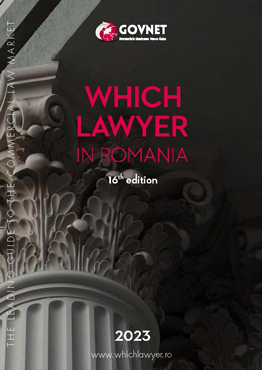- About Us
-
Expertise
- Banking & Finance
- Capital Markets
- Competition & Antitrust
- Corporate & Commercial
- Data Privacy
- Employment & Pensions
- Energy & Natural Resources
- Gambling & Betting
- Healthcare & Pharmaceuticals
- Insurance
- Intellectual Property
- International Arbitration
- Litigation
- Mergers & Acquisitions
- Project Finance/PPP, Concessions & Infrastructure
- Public Procurement
- Real Estate
- Restructuring & Insolvency
- Sports Law
- Tax
- Telecommunications, Media & Technology
- Transports & Logistics
- White Collar Compliance & Defense
- Our team
- Careers
- Publications
- News and Press
- Contact
Articles
Which Lawyer in Romania 16th edition
CORPORATE M&A
Confirmed Trends
in Transaction Legal Advisory

Florian Nițu, Managing Partner
Post-pandemic trends in transaction legal advisory look set to mark a fundamental shift in the general assistance model. The transactional legal work is by now legitimately expected by clients and stakeholders to remain lighter, faster, and of course better, while keeping up with the economic structural transformations. The "lighter-faster-better" approach is already the norm in terms of transactional due diligence scope and standard of review, project structuring, transaction documenting. Legal risk hedging has reached its golden years. Let us expand on the building blocks of this new approach.
Due Diligence Scope and Standard of Review
The usual suspects around critical impact clearances have traditionally been assessing and handling the relation with the relevant regulators or control authorities. More recently and acutely we are seeing an ever-pervasive intervention by the states with Aid Measures and Stimulus Packages, as well as by opening new Taxation roads, all justified by recourse to the better public good. In this context, checking the mechanism for analysing and authorising foreign investments from outside of the EU space has become of increasing importance. Together therewith, and of course related thereto, the assessment of conducting business bans and restrictions, as for example limitations of rights to partner or bid, limitations of capital expenditures or investment, including profit repatriations, are getting a central role in the diligence review. The same is applicable in case of the risk of state intervention by means of regulation or administrative actions, or by indirect competition more generally. Assessment from an FDI protection perspective became of a momentous importance. Irrespective of the international treaty instruments that one is looking at, all such legislative state aid measures, subsidies and tax pieces are typically host state measures taken within a state's right to regulate. It is true that the right to regulate remains a largely recognized qualifier to any standard of protection of investment, but the test against all basic protection standards to determine if measures could get effectively expropriatory, or discriminatory, or disproportionate to the objective that they intend to achieve must be made.
Careful review of change of control provisions of all nature, scale and effect, and at all levels, remains a key concern, including with respect to the risk to trigger a hostile action or a takeover or a mandatory procedure of any kind as a result of the prospected transaction. Nonetheless, at the same time the compliance package – "The ABC Review" – and the reputational assessment, including issues in the public-private relation, got equally important. Same goes with what I refer to as "The Triple K Analysis" or the KYP – KYS – KYC Assessment [know your partner, your supplier and your customer]. All these require an even more pervasive investigation when it comes to publicly funded contracts, joint venture agreements and consortia or contractor or subcontractor agreements in relation to public to private contracts, which will add a layer of complexity where there is 'PEP involvement'. Scrutiny of contractual arrangements where politically exposed persons are involved has always been a hot point in the DD, but the standard of review got elevated notably. As it is the case with the assessment of conflicts of interest.
I would add here three other major trends. One refers to rating the stability of the target core business from a legal standpoint, which entails the legal review of matters relevant for the target's supply chain security, but also for key customer retention or the labour and expert capital stability. With it, the retention rate and review of relations in view of contracting or restating contracts with senior management is also a must. A second one purports to a shift of focus in the analysis of project target indebtedness regime, a re-prioritizing of the assessment over the quality of the financing, the risk of cross default and the solidity of senior collateral securities regime. Open-ended arrangements with contingent liabilities, including partnerships, undertakings of loss compensation or gapping a guaranteed income, as well as previous mergers and acquisitions tail obligations, also represent a feature of the core business legal stability rating. Thirdly, litigation due diligence turned more into assessing the dispute resolution conduct, resources and scoring of the target, based not only on the general dispute standing and representation, but also on the general performance of undertakings.
Project Structuring
Forum shopping in transaction structuring raises more challenges than ever. That is a more natural approach under which the jurisdiction of the target company and of the purchaser are first considered is preferrable. Alternatives for optimization are explored still, but aggressive planning charges are more realistic risks now than in the past. This said, project structuring sees the target jurisdiction and the core places of the business as the backbone of transaction mechanics, while the corporate or management legal quarters stay ancillary to it.
More often, transactions are structured as asset deals, or asset-based deals, with various and more complex caveats indeed, or as transfer of business (as a going concern). The number of transactions structured as neat share deals is significantly decreasing.
Contract culture seems to have finally absorbed the predicament that the best protection one can get in a deal does not come from the contract language, but from transaction structuring and, notably, from the project processes, carefully designed to govern the investment relationships from the initial ice-breaker talks to the most remote post-acquisition covenant.
Transaction Documenting
We are facing a new very complex evolution in the transaction legal documenting work, in itself a consequence of the shift in the due diligence scope and standard of review and originating in the structural transformations taking place in the economic sector. In our experience, transaction documenting is marked by five major factors of development.
First, there is an advent of "umbrella agreements", definitely more often used nowadays than previously. Secondly, transaction mechanics see a certain preference for one-step completion structures, as opposed to two-step structures where signing and closing used to be detached. Thirdly, the architecture of conditions precedent is changing dramatically, as only fully objective, material CPs get their way through now, and mainly those related to regulators, clearances or certifications. Fourthly, a 'demise of the MAC clause' is taking place, with material adverse change and material adverse effect provisions being resisted more and more successfully on the sale or commitment side. Fifth, gun-jumping and conduct covenants contract menus are also notably reduced.
Legal Risk Hedging
But, to end with, the most spectacular change of recent years which seems able to yield permanent effects consists in what I tag as the legal risk hedging. Against a background where the specific performance of the undertakings is favoured towards collection of liquidated damages, new tools for managing transaction failure or loss risks have been developed. The most popular so far include Transaction Risk Insurance, Representations, Warranties and Indemnity Insurance, but also various ADR Mechanisms, such as Expert Board Determinations, as well as third party driven work-out or compensation methods.
Continue reading
ENERGY
Deploying Small Modular Reactors in Romania

Diana Dobra, Senior Associate
The transition to a neutral climate and clean economy along with the aim of improving external energy security by means of strengthening the production capabilities present substantial opportunities for developing net-zero technology sectors. It follows that the efficient seizing of net-zero opportunities will lead to significant industrial and economic shifts, while creating value, growth, additional jobs and a more resilient socio-economic system within the EU countries.
In this context, Romanian authorities looked into promoting investments in netzero technologies such as: small modular reactors (SMRs); electricity storage technologies & capacities; renewable energy technologies; grid technologies etc.
Being in a more advanced stage, the deployment of SMRs in Romania appears to shape a trend in terms of technology and partner selection process; financing structure, while also involving certain potential regulatory hurdles. Thus, we've pulled out 5 key insights with relevance for the SMRs.
Continue reading
LITIGATION
Implied obligations of good faith in contracts in Romanian law:
the Dispute escalation clause

Camelia Patrascu, Partner
It is often the case that in commercial contracts the parties provide for a dispute escalation clause as a precondition for litigation requiring parties to make a good faith attempt at negotiating the disputes before going to court.
The dispute escalation clause poses no challenges if adhered to. As long as the parties act in good faith and follow the specific contractual procedure, the precondition of attempting an amicable resolution of the dispute is fulfilled, regardless of the outcome of the negotiation.
But what happens when one party breaches the contract and bypasses negotiation by going straight to court? What effect do national courts give to this clause? Can the national courts intervene against the parties' contractual agreement and proceed to litigation?
These are the questions we aim to address below. Note that we are not considering the alternative dispute resolution procedure under FIDIC contracts, an issue which is also debated in the Romanian case law, and which should be considered even more cautiously by the national courts.
On the admissibility of the claim lodged with the national courts without observing the dispute escalation clause
Until 2013, the former Civil Procedure Code included a mandatory pre-litigation procedure for resolving monetary contractual disputes between professionals before proceeding to the courts, known as preliminary conciliation procedure.
The Constitutional Court of Romania was presented with numerous challenges asserting the unconstitutionality of this prelitigation procedure, alleging it impeded or constrained unhindered access to justice. Consistently, the Constitutional Court asserted that the preliminary procedure did not pose a barrier to unhindered access to justice. Rather, it served as an efficient means to curb the misuse of the right to access justice to the detriment of the individuals with similar safeguarded rights. In the perspective of the Constitutional Court, the rationale behind this mandatory procedure was to translate into practice the principle of expeditiously disposing of cases and alleviating the caseload burden on the judicial system.
Considering these pivotal considerations stressed out by the Constitutional Court, the requirement to observe the prelitigation procedure with the opposing party before proceeding to court cannot be categorized as an impediment to unrestricted access to justice or the right to an effective remedy.
With the enactment of new Civil Procedure Code, the conciliation procedure applicable to professional relationships has been rescinded.
However, the new Civil Procedure Code states, under article 193, that the referral to the court can be made only after a preliminary procedure has been completed, if the law expressly provides for this procedure.
A prevalent approach has been to construe the term "law" expansively, encompassing not only the statutory law but also the contract.
This interpretation remains valid as long as the Civil Code upholds, under art. 1270, para. 1, that a contract stands as the law for the contractual parties.
However, the legal precedent on this matter has affirmed that the dispute escalation clause is an optional procedure, allowing parties the freedom to seek recourse in the courts. The courts have argued that deviating from this standpoint would unduly restrict access to justice, surpassing the boundaries stipulated by law.
While we strongly advocate for unhindered access to justice, we find ourselves in partial disagreement with this standpoint.
On one hand, given that the Civil Procedure Code refers to "law", we argue that this term should encompass also contractual agreements, recognizing the contract as the governing law between the parties. This interpretation aligns with the parties' understanding expressed in the contract and acknowledges the binding force of the contract.
Moreover, a pre-litigation procedure should not be perceived as hindering access to justice. Rather it temporarily defers this recourse, especially considering that the duration between filing a claim and the scheduling of the first hearing often allows the plaintiff to concurrently pursue amicable conciliation.
Lastly, the non-acknowledgment of the mandatory nature of the dispute escalation clause freely agreed upon by the parties does not align with the fundamental principles outlined by the Constitutional Court: the principle of expeditiously disposing of cases and the alleviation of the caseload burden on the judicial system.
We hold the opinion that these principles are fully applicable nowadays.
We asses that even if the dispute escalation clause is considered optional, its disregard should not be devoid of consequences. The court, endowed with discretionary authority over specific facets of the case, could sanction the violation of this clause by withholding bad faith or abuse of procedural rights.
So far, we have not come across any legal precedent wherein the court has sanctioned bad faith and abusive exercise of the right of access to justice for violating the dispute escalation clause.
To sum up, the dispute escalation clause epitomizes the contractual freedom, expressed in good faith by the parties at the time of the contract's conclusion. Any groundless violation of this clause can only be construed as an act of bad faith and a breach of the contract.
The dispute escalation clause lays the foundation for safeguarding both individual and general interest, facilitating the enhancement of the judiciary system, by easing the caseload burden on the judicial system.
In the context of an overburdened legal system, we believe it would be worthwhile to reassess the courts' stance on the optional nature of the dispute escalation clause.
Continue reading
Download Article











